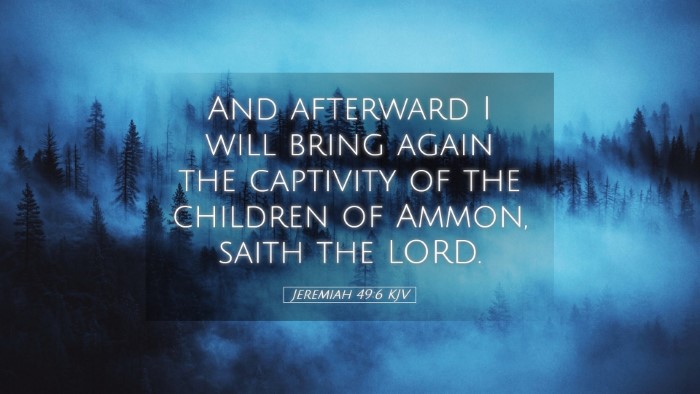Commentary on Jeremiah 49:6
Verse Reference: Jeremiah 49:6 - "And afterward I will bring back the captivity of the children of Ammon, saith the Lord."
Introduction
The prophetic words of Jeremiah concerning the fate of the nations surrounding Israel provide profound insight into God's plans for restoration, wrath, and grace. In this specific verse regarding Ammon, we see a transition from judgment to hope, a common theme throughout the prophetic books that calls for a deep understanding of God's character and His dealings with nations and individuals.
Contextual Background
To fully grasp the implications of Jeremiah 49:6, one must consider the historical and theological context of the Ammonites in Scripture. The Ammonites, descended from Lot, had historical enmity with the Israelites. Jeremiah's prophecy towards this nation underscores both the judgment they would face due to their pride and hostility against Israel and the eventual promise of restoration.
Historical Context
Understanding Ammon’s historical actions, particularly their hostility during Israel's exiles, is crucial. The Ammonites capitalized on Israel’s suffering and sought to expand their territory, reflecting their lack of compassion and their sinful pride. Jeremiah’s prophecies served as a rebuke and warning against such behaviors.
Theological Insights
This verse highlights two significant theological themes: divine judgment and divine restoration. These themes can bring comfort and a call to repentance for both contemporary nations and individuals.
Divine Judgment
As indicated in previous verses (Jeremiah 49:1-5), judgment is a consistent theme for the surrounding nations. Calvin comments on the justice of God, noting that nations that act with pride against God's chosen people will ultimately face consequences. The Ammonites were to experience the severity of divine retribution for their actions.
Divine Restoration
However, the message of hope is encapsulated in God's promise of restoration. Matthew Henry emphasizes that despite judgment, God's ultimate plan for His creation includes restoration and redemption. The proclamation of bringing back the captivity signifies hope for future generations—wherever the people of Ammon had suffered due to the consequences of their sin, God promises to bring them back to a place of favor and community.
Hebrew Linguistic Features
Understanding the original Hebrew terms can enrich our insight into the verse. The phrase "bring back the captivity" can indicate more than a physical return. It speaks to a spiritual restoration, reminding us of God’s desire to bring His people back into a relationship with Him.
Word Studies
- Bring Back (שׁוּב): This verb often carries connotations of repentance and a turning back to God, indicating a restorative process.
- Captivity (שָׁבוּת): This term can reflect not only servitude but also the broader concept of exile—both physical and spiritual estrangement from God.
Applications for Today's Context
This prophetic declaration has implications for contemporary readers, especially in addressing how nations may act towards others, how they engage in conflict, and their responsiveness to God's corrective actions.
For Pastors and Theologians
Pastors can draw from this text to illustrate themes of God’s judgment against sin, but also His unwavering promise of hope and restoration for those who turn back to Him. It serves as a poignant reminder that no nation is beyond God's redemptive reach.
For Students and Scholars
Students and scholars may analyze the structure of prophetic literature and how specific prophecies were intended to encourage repentance and reliance on God's will. This encourages rigorous study into the interplay between divine justice and mercy throughout biblical texts.
Conclusion
Jeremiah 49:6 embodies the dual themes of divine judgment and grace that permeate the Scripture. It serves as a reminder of God's serious dealings with nations and individuals while highlighting His longing for restoration and relationship. For readers today, it offers both a challenge to reflect on their actions and a comfort in knowing that God's plans ultimately lead to redemption.
Final Thoughts
Engaging with passages such as this provides fertile ground for theological reflection, challenging our understanding of God's justice interwoven with His mercy, and urges believers to seek and advocate for the restoration of relationships with God and others.


